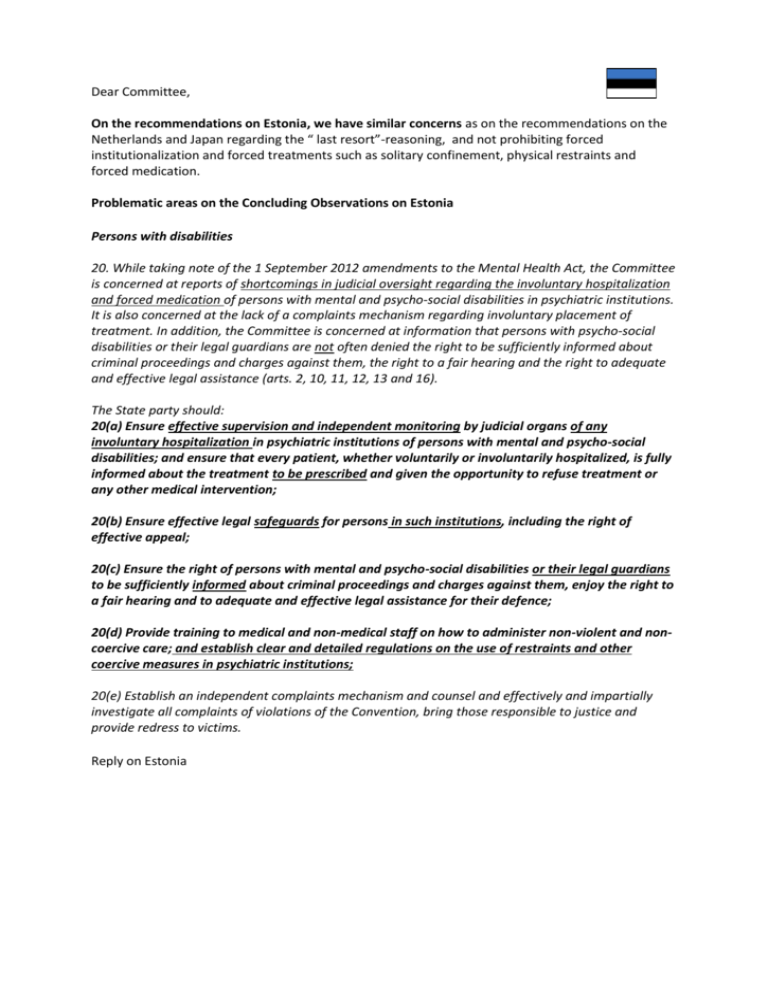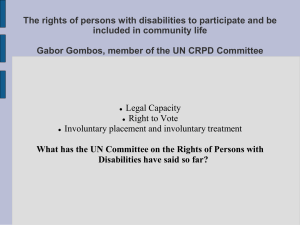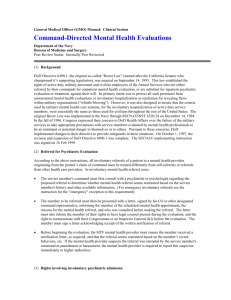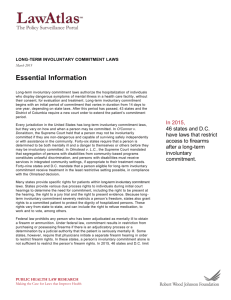Dear Committee, On the recommendations on Estonia, we have
advertisement

Dear Committee, On the recommendations on Estonia, we have similar concerns as on the recommendations on the Netherlands and Japan regarding the “ last resort”-reasoning, and not prohibiting forced institutionalization and forced treatments such as solitary confinement, physical restraints and forced medication. Problematic areas on the Concluding Observations on Estonia Persons with disabilities 20. While taking note of the 1 September 2012 amendments to the Mental Health Act, the Committee is concerned at reports of shortcomings in judicial oversight regarding the involuntary hospitalization and forced medication of persons with mental and psycho-social disabilities in psychiatric institutions. It is also concerned at the lack of a complaints mechanism regarding involuntary placement of treatment. In addition, the Committee is concerned at information that persons with psycho-social disabilities or their legal guardians are not often denied the right to be sufficiently informed about criminal proceedings and charges against them, the right to a fair hearing and the right to adequate and effective legal assistance (arts. 2, 10, 11, 12, 13 and 16). The State party should: 20(a) Ensure effective supervision and independent monitoring by judicial organs of any involuntary hospitalization in psychiatric institutions of persons with mental and psycho-social disabilities; and ensure that every patient, whether voluntarily or involuntarily hospitalized, is fully informed about the treatment to be prescribed and given the opportunity to refuse treatment or any other medical intervention; 20(b) Ensure effective legal safeguards for persons in such institutions, including the right of effective appeal; 20(c) Ensure the right of persons with mental and psycho-social disabilities or their legal guardians to be sufficiently informed about criminal proceedings and charges against them, enjoy the right to a fair hearing and to adequate and effective legal assistance for their defence; 20(d) Provide training to medical and non-medical staff on how to administer non-violent and noncoercive care; and establish clear and detailed regulations on the use of restraints and other coercive measures in psychiatric institutions; 20(e) Establish an independent complaints mechanism and counsel and effectively and impartially investigate all complaints of violations of the Convention, bring those responsible to justice and provide redress to victims. Reply on Estonia We suggest the following urgent revisions on the Concluding Observations on Estonia: 20. While taking note of the 1 September 2012 amendments to the Mental Health Act, the Committee is concerned at reports of the involuntary hospitalization and forced medication of persons with mental and psycho-social disabilities in psychiatric institutions. (…) The State party should: 20(a) Prohibit any involuntary hospitalization, including in psychiatric institutions; and ensure that all mental health care services including in psychiatric and social care institutions, are done on the basis of free informed consent of the person concerned, guaranteeing all effective legal safeguards; ensure that every patient is fully informed in advance about any proposed treatment and able at any point to refuse treatment or any other medical intervention; and ensure effective supervision and independent monitoring. 20(b) Ensure effective legal safeguards to protect persons with mental/psychosocial or intellectual disabilities from any instance of involuntary confinement or involuntary treatment on the grounds of a disability, including effective means to secure their immediate release and immediate cessation of forced treatment . 20(c) Ensure the right of persons with mental and psycho-social disabilities to be sufficiently informed in advance about criminal proceedings and charges against them, and to enjoy the right to a fair hearing and to adequate and effective legal assistance for their defence, including all disability-based accommodations; 20(d) Provide training to medical and non-medical staff on how to administer non-violent and noncoercive care, based on close consultation and equal partnership with people with psychosocial disabilities and their organisations;











